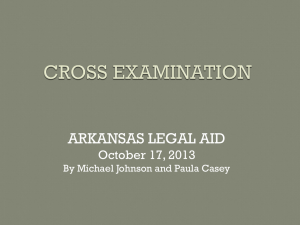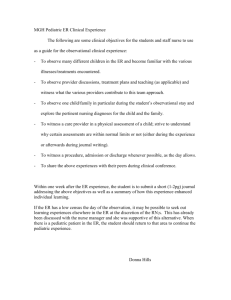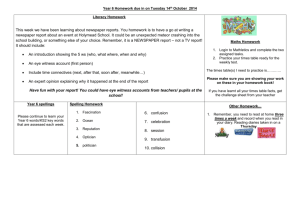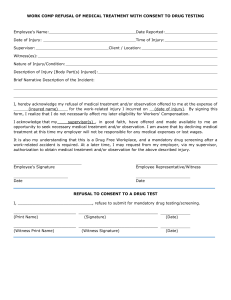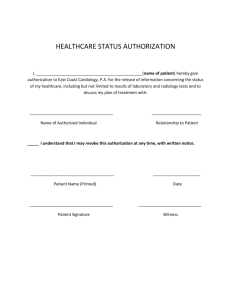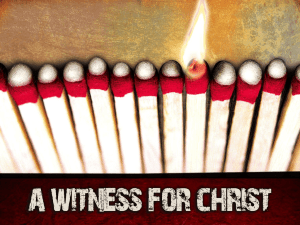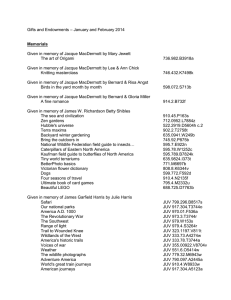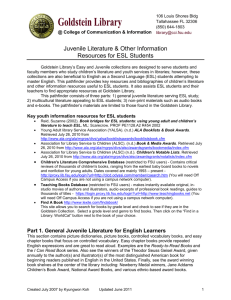Sample Discovery Letter
advertisement
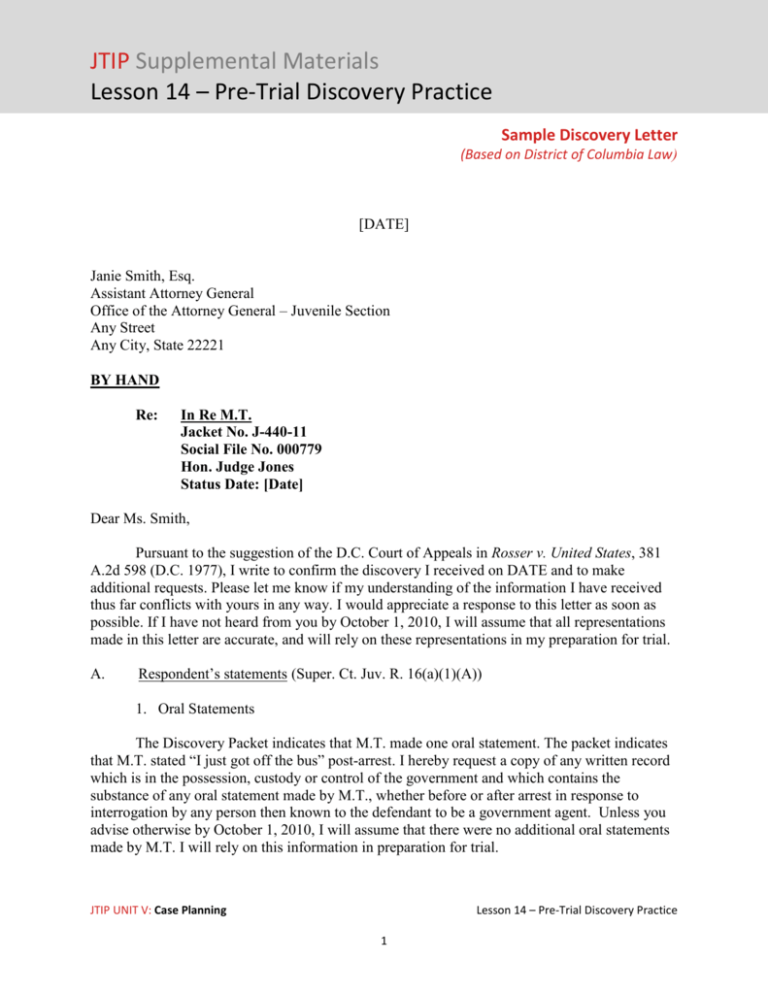
JTIP Supplemental Materials Lesson 14 – Pre-Trial Discovery Practice Sample Discovery Letter (Based on District of Columbia Law) [DATE] Janie Smith, Esq. Assistant Attorney General Office of the Attorney General – Juvenile Section Any Street Any City, State 22221 BY HAND Re: In Re M.T. Jacket No. J-440-11 Social File No. 000779 Hon. Judge Jones Status Date: [Date] Dear Ms. Smith, Pursuant to the suggestion of the D.C. Court of Appeals in Rosser v. United States, 381 A.2d 598 (D.C. 1977), I write to confirm the discovery I received on DATE and to make additional requests. Please let me know if my understanding of the information I have received thus far conflicts with yours in any way. I would appreciate a response to this letter as soon as possible. If I have not heard from you by October 1, 2010, I will assume that all representations made in this letter are accurate, and will rely on these representations in my preparation for trial. A. Respondent’s statements (Super. Ct. Juv. R. 16(a)(1)(A)) 1. Oral Statements The Discovery Packet indicates that M.T. made one oral statement. The packet indicates that M.T. stated “I just got off the bus” post-arrest. I hereby request a copy of any written record which is in the possession, custody or control of the government and which contains the substance of any oral statement made by M.T., whether before or after arrest in response to interrogation by any person then known to the defendant to be a government agent. Unless you advise otherwise by October 1, 2010, I will assume that there were no additional oral statements made by M.T. I will rely on this information in preparation for trial. JTIP UNIT V: Case Planning Lesson 14 – Pre-Trial Discovery Practice 1 JTIP Supplemental Materials Lesson 14 – Pre-Trial Discovery Practice 2. Written Statements The Discovery Packet indicates that M.T. did not make any written or recorded statements. Unless you advise otherwise by October 1, 2010, I will assume that there were no written or recorded statements made by M.T. I will rely on this information in preparation for trial. 3. Miranda The Discovery Packet also includes an unsigned PD 47. On the signature line the document states “in cuffs.” I will rely on this information in preparation for trial. B. Respondent’s prior record (Super. Ct. Juv. R. 16(a)(1)(B)) It is my understanding that M.T. has only one prior adjudication for simple assault in case J-1234-05. Aside from this, it is my understanding that M.T. does not have any other prior record. I will rely on this information in preparation for trial. C. Documents (Super. Ct. Juv. R. 16(a)(1)(C)) The Discovery Packet contains the following Metropolitan Police Department Forms: a complete PD 379 (two pages) a redacted PD 251 (four pages) one PD 81 pertaining to numerous zip locks containing a leafy substance, and empty zip lock bags (two pages) one PD 81 pertaining to U.S. currency in various denominations (two pages) a color photograph depicting numerous zip locks containing a leafy green substance, empty zip lock bags, and U.S. currency an unsigned PD 47 (one page) I hereby request all documents and reports which are within the possession, custody or control of the government, and which are material to the preparation of M.T.’s defense, or are intended for use by the government as evidence in chief at the trial, or were obtained from or belong to M.T. Superior Court Rule (Juv.) 16(a)(1)(C). Specifically, I request a DEA 7 analysis of the alleged controlled substances in this case. I also request complete versions of any incomplete documents previously provided. Unless I hear otherwise by October 1, 2010, I will assume that aside from the above-listed documents no other documents or reports exist. I will rely on this information in preparation for trial. D. Tangible Objects (Super Ct. Juv. R. 16(a)(1)(C)) The Discovery Packet indicates that packaged drugs, drug paraphernalia and U.S. currency were allegedly seized in this case. I hereby request the current location of the tangible JTIP UNIT V: Case Planning Lesson 14 – Pre-Trial Discovery Practice 2 JTIP Supplemental Materials Lesson 14 – Pre-Trial Discovery Practice evidence and a viewing letter authorizing me and my investigator, Alison Johnson, to view and inspect and photograph it. As you know, the government has the duty to preserve the evidence until defense counsel has been given the opportunity to view it, pursuant to United States v. Bryant, 439 F.2d 642, 652 (D.C. Cir.) (Bryant I), appeal after remand, 448 F.2d 1182 (D.C. Cir. 1971) (Bryant II). I hereby request any additional discoverable tangible evidence pursuant to Superior Court Rule (Juv.) 16(a)(1)(C), including objects within the possession, custody or control of the government and which are intended for use by the government in its case-in-chief, are material to M.T.’s defense or were obtained from M.T. Unless I hear otherwise by October 1, 2010, I will assume that no tangible evidence exists. I will rely on this information in preparation for trial. E. Photographs (Super Ct. Juv. R. 16(a)(1)(C)) The Discovery Packet indicates that color photographs were taken in this case. The packet includes two color copies of photographs depicting numerous zip locks containing a leafy substance, empty zip lock bags, and U.S. currency in various denominations. I hereby request an opportunity to view and make color copies of any and all originals of the photographs taken in relation to this case which are intended for use by the government in its case-in-chief or which are material to M.T.’s defense. Unless advised otherwise by October 1, 2010, I will assume that no other pictures exist, and rely on this in preparation for trial. F. Tape Recordings (Super. Ct. Juv. R. 16(a)(1)(C) Tangible Objects) I hereby request any and all radio runs, scout runs, ambulance runs, 911 calls, TAC Communications and police and ambulance recordings in connection with the alleged incident on September 15, 2010, as well as reports relating to those communications, which are within the possession, custody or control of the government, and which are material to the preparation of the defense or are intended for use by the government as evidence in chief at trial. Please provide all such communication no later than 10 days before trial as such communications are material to the preparation of the defense, without regard to whether the government intends to use such communications at trial. G. Results/Reports of Examination and Tests (Super. Ct. Juv. R. 16(a)(1)(D)) I hereby request any discoverable results or reports of examinations and tests pursuant to Superior Court Rule (Juv.) 16(a)(1)(D). Unless you advise otherwise by October 1, 2010, I will assume that no other reports of examinations or tests exist. I will rely on this information in preparation for trial. H. Expert Testimony (Super. Ct. Juv. R. 16(a)(1)(E)) JTIP UNIT V: Case Planning Lesson 14 – Pre-Trial Discovery Practice 3 JTIP Supplemental Materials Lesson 14 – Pre-Trial Discovery Practice I hereby request a Curriculum Vitae of any and all experts the government intends to call during trial as well as a written summary of the expert testimony that the government intends to rely on pursuant to Superior Court Rule (Juv.) 16(a)(1)(E). Unless you advise otherwise by October 1, 2010, I will assume that no expert testimony will be introduced at trial. I will rely on this information in preparation for trial. I. Identification The Discovery Packet indicates that a second sighting identification procedure was conducted in this case. I hereby request any notes, documents, reports, radio transmissions, recordings or other tangible evidence that pertain to any identification procedure which are within the possession, custody or control of the government and which are material to the preparation of M.T.’s defense, or are intended to be used by the government as evidence in their case in chief at trial. Aside from the second sighting, I understand that there was no other identification procedure used in this case. I will rely on this information in preparation for trial. J. Uncharged Misconduct Evidence The government has not provided notice of any uncharged misconduct evidence. I now assume there is no evidence of uncharged misconduct that the government intends to use in this case and the government will not attempt to introduce such evidence. See Drew v. United States, 331 F.2d 85 (D.C. Cir. 1964), Toliver v. United States, 486 A.2d 958 (D.C. 1983). I will rely on this information in preparation for trial. K. General Brady Request I hereby request all exculpatory information pursuant to Brady v. Maryland, 373 U.S. 83 (1963) and Lewis v. United States, 408 A.2d 303 (D.C. 1979). This includes all information that is known by the government (or which may become known to the government through the exercise of due diligence) and that is favorable to the defense and is material to the issue of guilt and/or punishment. It also includes all information indicating, in whole or in part, that M.T. did not commit the offenses with which he has been charged, regardless of whether the information is admissible at trial. L. Impeachment and Bias Material (Brady) I hereby make specific Brady requests for the following information: 1. All prior convictions and juvenile adjudications of all government witnesses. See Lewis v. United States. 393 A.2d 109 (D.C. 1978), aff’d on reh. 408 A.2d 303 (D.C. 1979). Pursuant to Lewis I am specifically requesting that you obtain an FBI rap sheet for all government witnesses. JTIP UNIT V: Case Planning Lesson 14 – Pre-Trial Discovery Practice 4 JTIP Supplemental Materials Lesson 14 – Pre-Trial Discovery Practice 2. All information in the possession of the government indicating that (a) any government witness has had a pending juvenile or criminal case on or since the offense in this case; (b) any government witness has had an arrest, guilty plea, trial or sentencing on or since the date of the offense in the pending case; (c) any government witness has been on juvenile or criminal parole or probation on or since the date of the offense; (d) any government witness now has or has had any liberty interest which the witness could believe or could have believed might be favorably affected by government action. With respect to this information, I request docket numbers, dates and jurisdictions for all such cases. See Davis v. Alaska, 415 U.S. 308 (1974); Washington v. United States, 461 A.2d 1037 (D.C. 1983); Beard v. United States, 535 A.2d 1373 (D.C. 1988). 3. Any prior inconsistent, non-corroborative or other witness statements that the witness’ trial testimony will not reflect. See United States v. Enright, 579 F.2d 980, 989 (6th Cir. 1978). 4. All information indicating that the mental state of any government witness is below normal or in any way abnormal. 5. All information that any government witness and/or informant was under the influence of alcohol, narcotics or any other drug at the time of the observations about which the witness will testify and/or informant informed, or that the witness’/informant’s faculties of observation were impaired in any way. 6. All information that any government witness has been or is a police informant either at the time of the offense and/or through the day of the trial. If any witness is, or has been, an informant, then I am requesting disclosure of: a. the length and the extent of the witness’ informant status; b. the amounts that have been paid to the informant in connection with this case; c. non-monetary assistance also provided the informant, including, but not limited to, assistance in avoiding or minimizing harm from charges pending against the informant, such status having existed either at the time of the offense and/or any other time through the day of trial; d. all benefits or promises of benefit or statements that benefit would not be provided without cooperation that were made to the informant in connection with this case, whether or not fulfilled (“benefits” refers to any monetary compensation, assistance of the prosecutor or the Court concerning pending charges against the informant, or any other sort of consideration of value); JTIP UNIT V: Case Planning Lesson 14 – Pre-Trial Discovery Practice 5 JTIP Supplemental Materials Lesson 14 – Pre-Trial Discovery Practice e. the nature of assistance provided in the past, including the number of occasions and form of help. See United States v. Bagley, 105 S. Ct. 3375 (1985). 7. All deals, benefits or promises of benefit, threats or statements that benefit would not be provided without cooperation that were made to any government witness in connection with this case, See Giglio v. United States, 405 U.S. 150 (1972). “Benefits” is defined in point (6)(d), supra. 8. All failures by any witness to provide the police or the government with information testified to at trial. 9. Any information that tends to show a government witness’ bias or corruption, see In re C.B.N., 499 A.2d 1215 (D.C. 1985), including anything in police officers’ personnel files indicative of corruption, see United States v. Brooks, 966 F.2d 1500 (D.C. Cir. 1992). 10. Perjury by any government witness at any time, whether or not adjudicated and whether or not in connection with this case. See Mooney v. Holohan, 294 U.S. 103 (1935); Sherer v. United States, 470 A.2d 732 (D.C. 1983), cert. denied, 469 U.S. 931 (1984). 11. Any information regarding any prior “bad acts” of a government witness that may bear upon the veracity of the witness with respect to the issues involved in the trial. See Lawrence v. United States, 482 A.2d 374 (D.C. 1984); Galindo v. United States, 630 A.2d 202 (D.C. 1993). 12. All information that any government witness has made prior false accusations, including but not limited to prior complaints to the police or enforcement agencies that did not result in a conviction. 13. Any other information tending to show a government witness’ bias in favor of the government or against the respondent or which otherwise impeaches a witness’ testimony (including pending C.C.R.B. complaints against police officers and closed C.C.R.B. cases, whether resolved for or against the officer, which involve facts similar to those of this case). See United States v. Bagley, 473 U.S. 667 (1985); Jenkins v. United States, 617 A.2d 529 (D.C. 1992). M. Other Brady Material I hereby request that I also be provided: JTIP UNIT V: Case Planning Lesson 14 – Pre-Trial Discovery Practice 6 JTIP Supplemental Materials Lesson 14 – Pre-Trial Discovery Practice 1. Identification. The names and addresses of any person(s) who: a. identified some person other than the respondent as a perpetrator of the alleged offense, see Cannon v. Alabama, 558 F.2d 1211 (5th Cir. 1977), cert. denied, 434 U.S. 1087 (1978); and the identity of the party, Gibson v. United States, 566 A.2d 473 (D.C. 1989); Grant v. Alldredge, 498 F.2d 376 (2d Cir. 1974); b. failed to identify the respondent as a perpetrator of the alleged offense when asked to do so in any identification procedure, see Gibson v. United States, 566 A.2d 473 (D.C. 1989); United States ex rel. Meers v. Wilkins, 326 F.2d 135 (2d Cir. 1964); c. gave any description(s) of the perpetrator of the alleged offense that in some material respect, e.g., height, weight, clothing, race, complexion, age, etc., differs from the respondent. See Frezzell v. United States, 380 A.2d 1382, 1385 (D.C. 1977), cert. denied, 438 U.S. 931 (1978). See also Gibson v. United States, 566 A.2d 473 (D.C. 1989); Jackson v. Wainwright, 390 F.2d 288 (5th Cir. 1968). 2. The names and addresses of all persons who could contradict or impeach any government testimony or other evidence. N. Plea Offers [No plea offer] While a plea offer has been informally discussed, I hereby request a formal plea offer and am interested in discussing disposition possibilities. [Plea offer made] The government extended the following plea offer: if M.T. pleads guilty to one count of Possession with Intent to Distribute (cocaine), the government will dismiss all remaining charges, waive step back and not oppose one year probation if M.T. complies with all conditions of his release and if it is recommended by Court Social Services. This plea offer expires on October 5, 2010. O. Other Requests I hereby request that I also be provided: 1. The names and addresses of all government witnesses. United States v. Holmes, 343 A.2d 272, reh. denied, 346 A.2d 517 (D.C. 1975). JTIP UNIT V: Case Planning Lesson 14 – Pre-Trial Discovery Practice 7 JTIP Supplemental Materials Lesson 14 – Pre-Trial Discovery Practice 2. Early disclosure of material pursuant to the ABA Standards for Criminal Justice 112.2 (The Prosecution Function), and the principles enunciated in United States v. Hinton, 203 U.S. App. D.C. 187, 197-198, 631 F.2d 769, 779-780 (1980), so that (1) any issues concerning disclosure may be resolved in advance, (2) counsel will have adequate time to review the material, and (3) there will be no delay of court proceedings while counsel reviews the material, considers any discovery or Brady ramifications, and prepares to use the material in cross-examination. To single out one recurring problem, tapes of radio communications take quite a lot of time to listen to and/or transcribe, as I am sure you have also discovered. I also request that you diligently preserve all material. Please respond to these requests as soon as possible. In the event that you are unable or unwilling to provide the requested material or that you disagree with any of the foregoing representations, please advise me promptly so that I may properly file any pre-trial motions. If I do not hear from your office regarding my requests by October 1, 2010, I will assume that 1) you agree with my representations regarding discovery produced thus far and 2) any requested material either does not exist or will not be used by the government at trial. I will rely on this assumption in preparing M.T.’s defense. For the purposes of this letter and any related litigation, “information” refers to all documentary, tangible, or oral material, including, but not limited to, statements by witnesses, whether recorded or otherwise memorialized or not, grand jury testimony and reports of investigation or personal notes of investigators. Such information is “known” to the government if known to you personally or known to any other prosecutor or government agent, and is known to the government if you could acquire actual knowledge of the information disclosed. Finally, as you know, the duty to disclose is a continuing one, stretching until the final disposition of the case. Thank you for your prompt attention to this matter. Sincerely, Attorney for M.T. cc: Clerk, D.C. Superior Court, Family Court JTIP UNIT V: Case Planning Lesson 14 – Pre-Trial Discovery Practice 8

